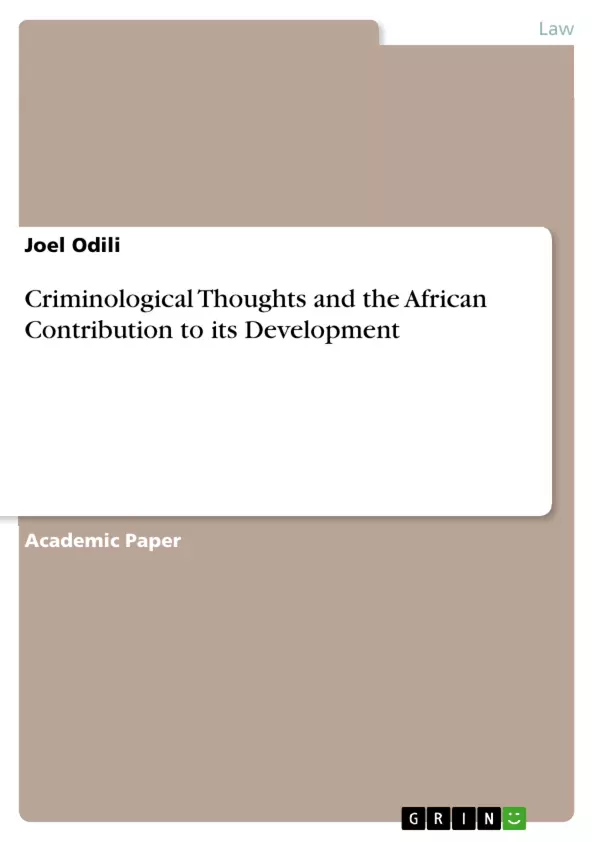This paper sets out to look at the African society before the influx of imperial powers and how their crime and punishment equation had emerged and was implemented in the society before it was eventually swept away by her New Masters.
Criminological ideas are often credited as western creation. This is a position held by many criminology writers and students alike globally, which by so doing denies Africa of a well-deserved acknowledgment of her contributions to criminological ideas. The African ideas have been erroneously regarded as “new ideas” by western nations. It is sad to observe that Africans themselves are contributors to this lack of recognition of their ideas. Africans considered their ideas as belonging to the trash bin of history, as they embrace the criminological ideas of Imperial powers. Unfortunately, the ideas which they rejected were refined by Europeans and sold to them as new wisdom.
Inhaltsverzeichnis (Table of Contents)
- Introduction
- Traditional Africa
- African World-view on Crime
- The Western Influence on African Criminological Ideas
- Lessons from African Criminological Ideas
- Conclusion
Zielsetzung und Themenschwerpunkte (Objectives and Key Themes)
This paper aims to examine the development and manifestation of criminological ideas within traditional African society before the arrival of imperial powers. It seeks to unveil the lessons learned from African cultures that were previously unknown to Western nations.
- The influence of African culture on its crime and punishment equation
- The distinct African world-view on various aspects of human life
- The evolution and implementation of African criminological ideas before colonial influence
- The impact of Western influence on African criminological thoughts
- The lessons that can be derived from African criminological ideas
Zusammenfassung der Kapitel (Chapter Summaries)
- Introduction: This chapter sets the stage by highlighting the purpose of the paper, emphasizing the significance of understanding African criminological ideas and their cultural context. It defines key terms like "criminological thoughts," "criminology," and "crime and culture," exploring their relationship with African society.
- Traditional Africa: This chapter investigates the existence of a legal system in Africa prior to colonialism, challenging the notion that Africa lacked a codified legal framework. It examines the role of customs and traditions in shaping African law and explores the concept of the "Volkgeist" to support the proposition that law should be rooted in a people's culture. It also delves into the system of checks and balances present in traditional African societies.
- African World-view on Crime: This chapter focuses on the African perspective on crime, highlighting the influence of culture and traditions in defining criminal acts. It uses proverbs, myths, and legends to illustrate the underlying ideologies of African crime and punishment.
- The Western Influence on African Criminological Ideas: This chapter explores the impact of Western colonialism on African criminological thought. It examines how African ideas were often disregarded or reinterpreted by Western powers, resulting in a distorted understanding of African justice systems.
Schlüsselwörter (Keywords)
This paper focuses on the intersection of African culture, criminology, and colonialism. It examines the development of African criminological ideas, their historical context, and their relationship to Western influence. Key terms include African culture, crime, punishment, traditional law, colonial influence, and Western criminology.
Frequently Asked Questions
What is the main goal of this paper on criminology?
The paper aims to highlight Africa's historical contribution to criminological ideas, which are often wrongly credited solely to Western creation.
Did traditional Africa have a legal system before colonialism?
Yes, traditional African societies had emerging crime and punishment equations rooted in their culture and customs long before imperial influence.
What is the "African world-view" on crime?
It is a perspective shaped by myths, legends, and proverbs that define criminal acts and punishment within a specific cultural context.
How did Western colonialism affect African criminological thought?
Colonial powers often swept away indigenous systems, regarding them as "trash" while later refining and selling these same ideas back as "new wisdom."
What is the significance of the "Volkgeist" in this study?
The concept supports the idea that law and justice systems should be inherently rooted in the culture and spirit of the people they serve.
- Citar trabajo
- Joel Odili (Autor), 2021, Criminological Thoughts and the African Contribution to its Development, Múnich, GRIN Verlag, https://www.grin.com/document/1031366



